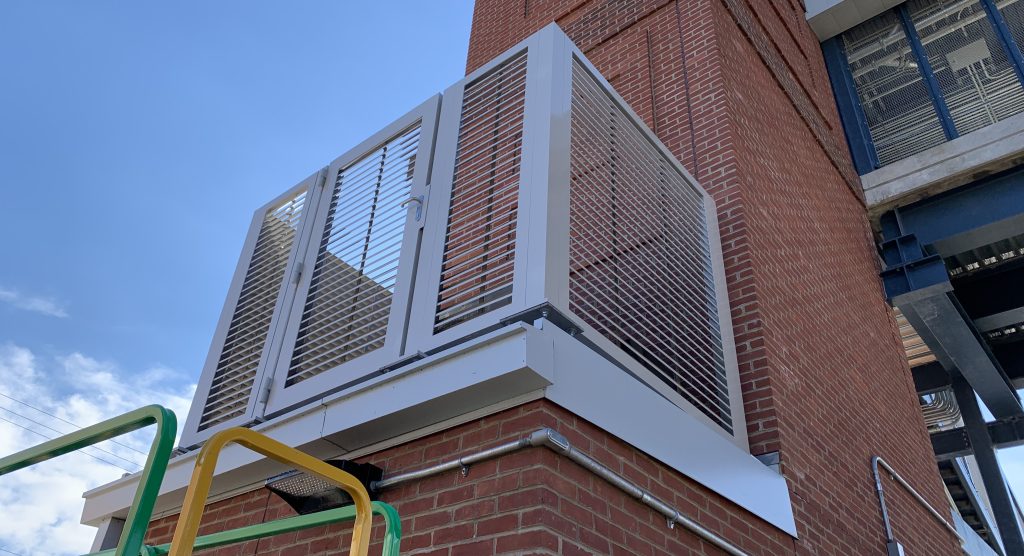Why Equipment Screens Need Architectural Louvers

Learn how louvered screens safeguard expensive equipment and permit necessary ventilation.
Even though mechanical equipment — HVAC units, cooling towers, generators, etc. — are necessary to create a comfortable, functioning environment within your building, they also constitute potential hazards. If installed in the open, with no perimeter security, these fixtures are reachable to unauthorized personnel, including children. This is irresponsible on the part of the property owner, as unmitigated access can result in injuries, such as:
- Cuts and abrasions. Many types of equipment feature sharp edges, and moving parts become attractive hazards to children, who can easily get their fingers or clothing caught in the mechanism. Imagine if they get stuck on a weekend, when — depending on the industry — few to no employees are on campus.
- Fall-related injuries. HVAC units are small enough to climb on but large enough to produce fall-related injuries. Tumbling from atop one of these units can result in bruises, broken bones, and concussions. Remember kids’ curiosity and their propensity to explore anything that catches their interest!
- Electrocution. Most mechanisms today are powered by electricity, and not all electrical parts are protected by the chassis. The ideal solution is to have an enclosure that keeps everyone who’s not a maintenance worker from touching the equipment and its various parts.
Security is a major reason for installing mechanical equipment screens. Put together with a matching gate, these panels form a protective perimeter that helps keep out not only kids but vandals and animals. (In doing so, you’re also shielding mechanical equipment from costly damage. Constant repairs will leave significant red marks on your annual budget. The money you’ll spend on equipment screens proves a worthy long-term investment.) On top of that, property managers in many communities today are required by law to screen out mechanical equipment from public view. This is to maintain consistent aesthetics, as HVAC units and whatnot detract from your building profile.
But which equipment screen style is right for you? There are numerous options on the market, including solid, semiprivate, and artistic laser cut. But the most common is architectural louvers, which consist of slats installed parallel to one another to create a vent-like infill.
Architectural louvers permit necessary ventilation for mechanical equipment
An operating piece of equipment can release a number of byproducts, such as: smoke, heat, and moisture. If you install a solid screening system around your machinery, all of this residue will remain trapped in a tight space. When this happens, the released moisture and condensation can eventually promote mold growth. Contained pockets of heat can lead to the machinery overheating and malfunctioning (or worse: catching fire)! And trapped smoke is an instant hazard for workers. For this reason, many architects and engineers opt to install our signature architectural louvers.
Here at PalmSHIELD, we custom design and fabricate our mechanical equipment screens to meet the exact needs of the client. This includes the angle and spacing at which the louvers are installed. We can provide up to 100% direct visual screening (completing sealing off your equipment from view) while still providing a necessary degree of airflow. If you need a little more spacing, we can provide that. The idea is to provide an outlet through which fumes, condensation, etc. can escape.
Get your louvered screens from PalmSHIELD
As mentioned previously, PalmSHIELD has a policy of custom-manufacturing screens to meet your specific needs. When you supply your team with the measurements of your job site, our designers put together original CAD drawings in accordance with said information. We don’t start fabricating the screens until you approve the drawings. Did we also mention our powder coating technology? This allows us to color your screens to match your building profile. Ready to discuss your screening project? Contact our sales team today!
